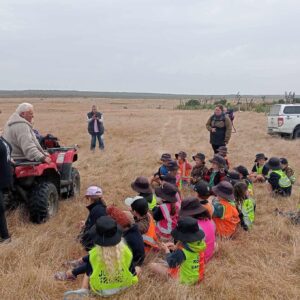From her tiny school on the appropriately named Forgotten Highway, Anna Fourie teaches students across the country, using the internet.
Fourie’s physical classroom is in Ohura, a once-busy mining and rail town in the King Country. Today, there are only eight children at Ohura Valley School and much of the town is boarded up. The last shop closed a while back.
Fourie came here to farm with her husband over a decade ago and soon started teaching at the school. Back then, there were more students. Last year, there were 15 regular attendees – and the loss of even one family from the town can create a significant gap in the school roll.
The loss of even one family from the town can create a significant gap in the school roll.
Fourie took over as principal a couple of years ago and stumbled into online teaching when she was searching for ways to provide a richer curriculum for her students. Specifically, she wanted to provide more advanced Te Reo Māori instruction than she was able to give herself. She discovered the Virtual Learning Network (VLN) Primary.
“What they offered was ideal for my senior students,” says Fourie. “VLN Primary has online classes that follow the curriculum, teaching Levels 1 and 2. While we were discussing the classes, I mentioned that I’m an Afrikaans speaker and they asked if I would be keen to teach an online class. That way I could defray the cost of my students joining in the classes.”
Fourie has been teaching Afrikaans online for a few years now. Usually, she has a class of at least six students from as many schools, spread across both main islands.
“Not all the students are from South African families,” says Fourie. “There are students who have South African neighbours and others who just want to learn another language.”
Fourie says she gets huge satisfaction from teaching online. She feels she’s contributing to her adopted country’s cultural diversity.
Fourie says she gets huge satisfaction from teaching online. She feels she’s contributing to her adopted country’s cultural diversity.
Teaching students remotely is a little different to conventional classroom teaching, but Fourie finds the Zoom platform helps to build engagement, making the classes highly interactive.
“I plan the online lessons as I do any other class, and I like that my teaching is appraised by having someone from VLN Primary sit in. It’s good to have feedback,” she says. “The learning is as intense as any classroom learning and the expectations are the same. Students are expected to attend regularly, do homework and engage in independent learning and practice.”
Fourie often sits in on her Ohura students’ online classes. It gives her a chance to see other teachers at work. As well as the students enrolled in learning Te Reo Māori, there are some doing extension maths and technology classes.
“The online classes have helped the school create more individualised learning programmes. They help me extend students in areas that they need to be extended, so that they become better people. At the same time our older students have been able to benefit from engaging with others their own age.”
For a small isolated school, the online option is invaluable.




